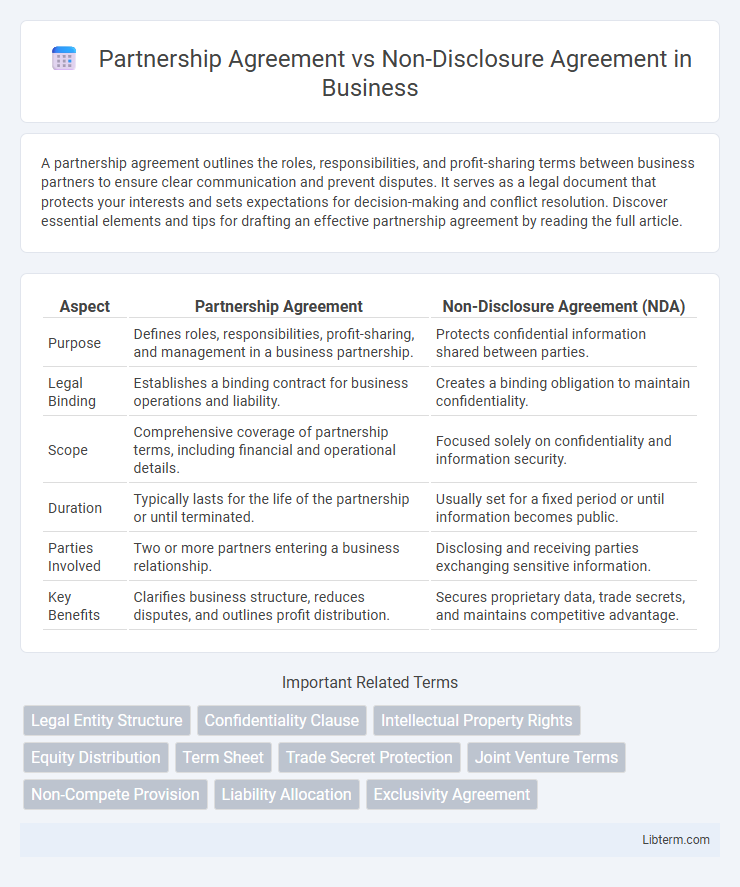A partnership agreement outlines the roles, responsibilities, and profit-sharing terms between business partners to ensure clear communication and prevent disputes. It serves as a legal document that protects your interests and sets expectations for decision-making and conflict resolution. Discover essential elements and tips for drafting an effective partnership agreement by reading the full article.
Table of Comparison
| Aspect | Partnership Agreement | Non-Disclosure Agreement (NDA) |
|---|---|---|
| Purpose | Defines roles, responsibilities, profit-sharing, and management in a business partnership. | Protects confidential information shared between parties. |
| Legal Binding | Establishes a binding contract for business operations and liability. | Creates a binding obligation to maintain confidentiality. |
| Scope | Comprehensive coverage of partnership terms, including financial and operational details. | Focused solely on confidentiality and information security. |
| Duration | Typically lasts for the life of the partnership or until terminated. | Usually set for a fixed period or until information becomes public. |
| Parties Involved | Two or more partners entering a business relationship. | Disclosing and receiving parties exchanging sensitive information. |
| Key Benefits | Clarifies business structure, reduces disputes, and outlines profit distribution. | Secures proprietary data, trade secrets, and maintains competitive advantage. |
Understanding Partnership Agreements
Partnership agreements clearly define the roles, responsibilities, profit-sharing, and decision-making processes between business partners to ensure transparency and prevent disputes. These legal documents establish the framework for managing the partnership's operations, including capital contributions, management duties, and exit strategies. Unlike non-disclosure agreements that focus on confidentiality, partnership agreements provide a comprehensive structure for the long-term collaboration and governance of the business relationship.
What is a Non-Disclosure Agreement (NDA)?
A Non-Disclosure Agreement (NDA) is a legally binding contract that establishes confidentiality obligations between parties, ensuring sensitive information such as trade secrets, business strategies, or proprietary data remains protected from unauthorized disclosure. Unlike a Partnership Agreement, which defines roles, responsibilities, and profit-sharing among business partners, an NDA specifically focuses on safeguarding confidential information during collaborations, negotiations, or employment. NDAs are crucial for maintaining competitive advantage and trust when sharing private or valuable information.
Core Differences: Partnership Agreement vs NDA
A Partnership Agreement outlines the roles, responsibilities, profit sharing, and decision-making processes between business partners, establishing a legal relationship and mutual obligations. A Non-Disclosure Agreement (NDA) focuses solely on protecting confidential information shared between parties, preventing unauthorized disclosure without creating a business relationship. The core difference lies in the Partnership Agreement governing business collaboration and ownership, whereas the NDA ensures confidentiality without defining business structure or operational terms.
Key Components of a Partnership Agreement
A Partnership Agreement outlines key components such as profit sharing ratios, management roles, capital contributions, and dispute resolution mechanisms, defining the operational framework and financial responsibilities among partners. It also includes terms for the admission or exit of partners, intellectual property rights, and the duration of the partnership. Unlike a Non-Disclosure Agreement, which centers on confidentiality clauses, a Partnership Agreement establishes the legal and financial foundation essential for collaborative business ventures.
Essential Clauses in a Non-Disclosure Agreement
Essential clauses in a Non-Disclosure Agreement (NDA) include the definition of confidential information, specifying the scope and nature of what must be kept secret. The agreement outlines obligations of the receiving party, detailing how the information can be used and measures required for protection. Terms covering the duration of confidentiality, exclusions from confidentiality, and consequences of breach are critical for enforcing the NDA effectively.
When to Use a Partnership Agreement
A Partnership Agreement is essential when two or more parties intend to create a formal business relationship, outlining roles, profit sharing, and responsibilities. It defines the terms for managing the partnership, resolving disputes, and handling financial contributions, ensuring legal clarity and protection. Use a Partnership Agreement when establishing a collaborative business venture with shared ownership and long-term commitments.
When an NDA is Necessary
An NDA is necessary when parties need to protect sensitive information during early discussions or collaborations before finalizing a Partnership Agreement. It ensures confidentiality of proprietary data, trade secrets, and business strategies shared between potential partners. While a Partnership Agreement outlines the terms of collaboration, an NDA safeguards information to prevent unauthorized disclosure and maintain competitive advantage.
Legal Implications of Each Agreement
A Partnership Agreement legally defines the roles, responsibilities, profit-sharing, and dispute resolution methods among business partners, creating binding obligations that protect each party's rights and outline consequences for breaches. A Non-Disclosure Agreement (NDA) legally enforces confidentiality, preventing parties from disclosing proprietary information and providing remedies such as injunctions or damages in case of unauthorized disclosure. While a Partnership Agreement governs the broader framework of business collaboration, an NDA specifically safeguards sensitive information within or outside that partnership, with both agreements carrying distinct legal implications for compliance and enforcement.
Choosing the Right Agreement for Your Business
Selecting the appropriate legal contract between a Partnership Agreement and a Non-Disclosure Agreement depends on your business objectives and the nature of the relationship. A Partnership Agreement defines roles, profit sharing, and decision-making processes essential for joint ventures or formal business partnerships, providing a clear framework for collaboration and conflict resolution. In contrast, a Non-Disclosure Agreement protects sensitive information during negotiations or preliminary discussions without establishing ownership or operational control, making it ideal for safeguarding trade secrets and proprietary data.
Best Practices for Drafting Partnership and NDA Documents
Effective drafting of Partnership Agreements and Non-Disclosure Agreements (NDAs) requires clear definitions of roles, responsibilities, and confidentiality obligations tailored to each document's purpose. Best practices include specifying the scope and duration of partnership activities or information protection, incorporating dispute resolution clauses, and ensuring mutual understanding of terms to prevent future conflicts. Precise language, compliance with applicable laws, and regular reviews by legal professionals enhance enforceability and safeguard the interests of all parties involved.
Partnership Agreement Infographic

 libterm.com
libterm.com